PhD Candidates
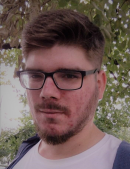
Hubert Będkowski
Hubert Będkowski received his BA (specialization: Citizen and Society) and MA (specialization: Biological and Cultural Diversity) diploma at the Faculty of „Artes Liberales” at the University of Warsaw. His BA thesis was titled „Bioresistances of the homeless. Homelessness in the space of biopower” and his MA thesis was titled „Biopolitical Zoo of Genes. Discourse and Practices of Modern Zoological Gardens Associated in EAZA”. His main research interests are biopolitical aspects of human-animal relations, technological mediations between nature and culture and discourses related to genetics and population management of wild animals. In his PhD dissertation, he wants to focus on interdisciplinary analysis of changes in the zoo paradigm seen in the European Association of Zoos and Aquaria (EAZA). He is the founding member and vice president of Student Research Circle „Animal Studies” UW. His other academic interests include evolutionary anthropology, animated cinema, sociology of higher education and limits of knowledge and cognition.

Aleksandra Brylska
She graduated from art history at the Institute of Art History at the University of Warsaw and cultural studies at the Institute of Polish Culture at the University of Warsaw. Currently a participant of the international doctoral program "Nature-Culture" at the Faculty of "Artes Liberales" at the University of Warsaw. She is preparing a doctoral dissertation on the subject of the natural-cultural status of post-nuclear spaces, on the examples of the disasters of nuclear power plants in Chernobyl (Ukraine) and in Ōkuma (Fukushima prefecture, Japan). She participated in numerous international scientific conferences about posthumanism and environmental humanities (including An ArtScience Workshop: In the Clouds, the First Baltic Conference on the Environmental Humanities and Social Sciences - BALTEHUMS). She published in scientific journals, such as "Amor Fati" and "Studia Europaea Gnesnensia". She is interested in the methodology of environmental humanities, the environmental history of post-nuclear spaces, biosemiotics and philosophical and cultural conditioning the idea of Nature. She is also interested in visual culture after the Second World War, the relationship between man and the environment and the cultural consequences of the term "Anthropocene".
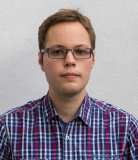
Piotr Chmielewski
Piotr Jerzy Chmielewski is PhD student at the Faculty of Artes Liberales, University of Warsaw. He graduated from the Adam Mickiewicz University in Poznań and holds Master degree in Environmental Sciences. His dissertation is entitled “Social and cultural determinants of human-wildlife conflicts between wolves and local communities in Poland”. His research interests focus on human dimensions of wildlife (especially large carnivores).
In his practical work Mr Chmielewski works as Biodiversity Protection Specialist in WWF Poland and he is the national coordinator of the project „LIFE EUROLARGECARNIVORES: Improving human coexistence with large carnivores in Europe through communication and transboundary cooperation”.

Wojciech Cendrowski
Wojciech Cendrowski graduated from the Institute of Ethnology and Cultural Anthropology at the Adam Mickiewicz University. He has undertaken ethnographic fieldworks in Poland, Germany and Russia. Before the International PhD Program “Nature-Culture” he spent one-semester long scholarship at the Irkutsk State University and he took part archaeological expedition organized by Russian Geographical Society in Republic of Tuva in 2015. His PhD project, written under supervision of Jan Kieniewicz and Kamil Wielecki, is entitled “The role of indigenous ontology and different concepts of Nature in shaping post-Soviet landscape in the Baikal region”. His research interests focus on urban studies, especially relation between space, identity and state; interaction between landscape and identity in constructing local communities; political economy and border studies. He is member of the Polish-Siberian Working Group at the Faculty of Artes Liberales.

Natalia Copeland
Natalia Copeland researches musical creativity, merging methodological approaches of cognitive science, music psychology and psychology of creativity. Her PhD dissertation is entitled: “Study of composers’ involuntary musical imagery – epiphany as a cognitive phenomenon”. The aim of the study is to get a better understanding of the sudden appearance of musical ideas in composers. The thesis is supervised by Piotr Podlipniak, PhD (Adam Mickiewicz University, Poznań) and Professor Szymon Wróbel (University of Warsaw).
Natalia Copeland’s interest in music and its intertwinings with different media is reflected in her master theses subjects: “Music for film, film for music. The role of music in Polański’s and Kieślowski’s films” (Cultural Studies, Katholieke Universiteit Leuven, Belgium. Supervisor: Mieke Bleyen, PhD) and “The influence of allowing use of an original song in television advertisement on the image of the artist with regard to the type of advertized product” (Psychology, University of Warsaw. Supervisor: Prof. Ewa Czerniawska). Her involvement in the subject of musical creativity stems from her own experience as a music composer.
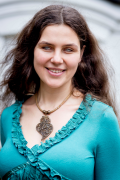
Monika Dubiel
Monika Dubiel is a graduated of College of Inter-area Individual Studies in the Humanities and Social Sciences at the University of Warsaw in psychology (MA 2014) and Spanish Studies (BA 2011, MA 2017). She pursued partial studies at the University of Barcelona, at the University of Lisbon, at the Tomsk State Pedagogical University and at The University of North Carolina at Greensboro. She also did an internship in Italian Union of the Blind and Partially Sighted in Siena. Her research interests are in the areas of disability studies and postcolonial studies. Her past scientific interests include also religious syncretism and popular saints in Latin America. Within Nature and Culture PhD Program she works on the question of representation of the disability in modern culture. She investigates the issues of literary portraying, self advocacy and symbolic meaning of blindness in Latin America. The defense of her thesis is planned for 2022.

Aleksandra Jabłońska
Aleksandra Jabłońska earned her MA in Clinical Psychology at the SWPS University of Social Sciences and Humanities. Her interests revolve around cognition, learning, consciousness and welfare of corvids. All these issues are combined in her PhD thesis: ‘No work and no play makes Crow a dull boy. On intra- and inter-species aspects of learning in corvids. Impact of cognitive training on welfare of birds rehabilitated in bird shelters’, developed under the supervision of Professor Joanna Pijanowska and dr. hab. Marcin Brzeziński. In her previous research, she addressed topics such as cognitive bias and suicidal tendencies among persons diagnosed with schizophrenia. At present, she is mainly interested in animal cognition, culture and language as well as psychic disorders among captive and domesticated animals. In addition, in 2019 she started a course in Zoopsychology. Apart from her academic interests, she works as a psychologist and memory coach. In her free time, she pursues her hobby of nature photography and birdwaching.
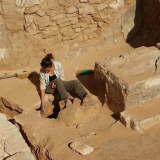
Kornelia Kasperkiewicz
Kornelia Kasperkiewicz graduated at the Institute of Archaeology at the University of Warsaw (MA). Before, she has studied at the Freie Universität Berlin at the Institute of Near Eastern Archaeology and at the Faculty of Architecture at the Technische Universität in Cottbus. During her studies, she gained experience in several archaeological expeditions including excavations in Turkey, Saudi Arabia, Armenia, and Egypt. She also worked in the field of Contemporary Archaeology conducted on the Tempelhof Airport in Berlin (Germany), which was dealing with II World War labor camps. Her dissertation project in the Ph.D. Program „Nature-Culture“ at the Faculty of „Artes Liberales“ is going to be focused on the material culture and cultural identity that evolved during the settlement process of so-called „Aramean people“ in the 1st millennium BC in northern Mesopotamia. A key question in this thesis deals with the human-environment relation and its influence on the material culture and cultural identity of these societies. Her academic interests include landscape and environmental archaeology, modern theories in archaeology and mobile societies in the 1st millennium BC in the Near East. Her experiences and academic work so far lead to an overall interest in bridging the gap between the humanist and natural sciences in archaeology.
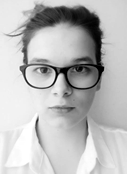
Julia Krzesicka
Julia Krzesicka has completed with honors master’s degree in Applied Sociology and Social Anthropology from the University of Warsaw (2016-2018). In 2016 she has also undertook a second master’s degree course in Cognitive Science within College of Inter-Area Individual Studies in the Humanities and Social Sciences, where earlier she finished her BA in International Relations (2016) and Applied Sociology and Social Anthropology (2016). Since the very beginning her university education went beyond the scope of one discipline – the idea of inter-area studies helped her raised awareness and interest in crossing the disciplinary boundaries. It’s reflected in the topics of her dissertations, which were placed on the crossroads of sociology and international relation’s (Towards Reflexive International Relations: The Application of Pierre Bourdieu's Sociological Theory to the Analysis of IR, BA 2016) or took the peripherical research perspectives, highly influenced by the frame of reference of other disciplines, such as history (Smell under Control? Olfactory Subjugation of Human as Part of the Process of Civilizing, BA 2016) or phenomenology (On Becoming a “Professional Toucher”. Body, Touch and Intimacy in the Context of Physiotherapy Work, MA 2018). She gained her academic experience, among others, as a part of Human Interaction and Language Lab (Faculty of Psychology, University of Warsaw) and as a research assistant within project HEURIGHT14. Her areas of interest include sociology, anthropology and philosophy of new technologies, especially in terms of design, HCI, social robotics, embodiment and senses.
She is currently preparing her PhD thesis within the section of Techno-Philosophy under the supervision of Professor Szymon Wróbel.
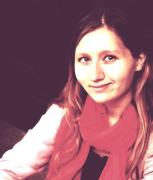
Magdalena Krzosek-Hołody
Born in 1989. Graduate of AGH-UST (University of Science and Technology) in Cracow in the field of Culture Studies (specialization in new media and visual communication) and Acoustic Engineering. Her graduation projects focused on animated film, soundscapes and field recording. During her studies she completed two scholarships: Tel Aviv University (Israel) and Universidad de Salamanca (Spain). She combines academic research with artistic projects. She cooperated with many cultural institutions e.g. International Film Festival Etiuda & Anima in Cracow, MediaLab Katowice, POLIN Museum in Warsaw, Wanda Siemaszkowa Theatre in Rzeszów, Estrada Rzeszowska, Podkarpackie Film Commision and many others. Currently she is a participant of the International “Nature-Culture” Program at the Faculty of “Artes Liberales” (University of Warsaw). She is working on her dissertation on the aesthetics of engagement and the relation between art and landscape. Her scientific interests include: contemporary art, land & environmental art, critical and speculative design, community-building practices. In 2017 she enrolled in Landscape Architecture program which she intends to combine with her dissertation project. She is looking forward to seeing where this fusion will lead in her future academic work.
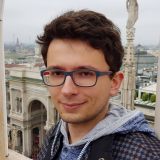
Marcin Kozak
Marcin Kozak holds an MA in Law, BA in Philosophy and BA in Liberal Arts. He graduated with honours from the University of Warsaw and studied within the Inter-area Individual Humanistic and Social Studies. He also participated in Erasmus+ Programme and American Institute on Political and Economic Systems at Charles University in Prague. Currently he is pursuing a diploma from the Center for American Law Studies organized by the University of Warsaw, Emory University and Georgia State University.
Marcin Kozak’s PhD thesis (under the supervision of Professor Szymon Wróbel) investigates the problem of prosthetic and progressive corporeality in the light of jurisprudence, cognitive science and philosophical anthropology. His intellectual areas of interest include computes games studies, the political economy of capitalism, new technologies, visual culture and Polish literature.
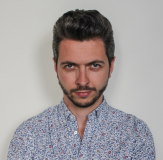
Łukasz Mańkowski
Łukasz Mańkowski graduated from Nicolaus Copernicus University in Japanese Studies (MA) as well as Cultural Studies and Film Theory (MA). He was a part of Far East Film Festival Campus in Udine, Edinburgh International Film Festival Students Critic Competition, WFF Fipresci Workshops and 5 Flavour Film Festival People's Jury member. Within the PhD Nature-Culture Interdisciplinary Program he is working on the image of Japanese groupism in Japanese Cinema. He focuses on Japanese New Wave and Avant-garde Cinema and its continuum in contemporary film as well. His research topics include Japanese anthropology, Japanese aesthetics, antinuclear movement and its representation in art. Outside of that, he is popularizing Asian Cinema in Poland and is a co-founder of Polish blog devoted to Asian Cinema - "Refarat Filmowy". Aside from his academic occupations, he is currently freelancing as a film journalist, Japanese language translator cooperating with film festivals and eating Japanese ramen.
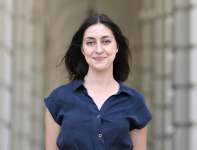
Maria Piekarska
Maria Piekarska graduated from the University of Warsaw in International Relations in the Middle East (MA) specializing in critical geopolitics and identity politics of modern Israel and the Middle East, and Law (MA) specializing in European Union environmental law. She has also studied at the University of Haifa, Israel, where upon graduation she spent an additional year at the Department of Geography with the Israeli Ministry of Foreign Affairs Scholarship for Young Researchers. Within the Interdisciplinary PhD Program “Nature-Culture” she is working on the phenomenon of commemorative walking paths in Israeli natural landscape as means of identity building under the supervision of Professor Jolanta Sujecka (University of Warsaw, Faculty of “Artes Liberales”) and Professor Shoshana Ronen (University of Warsaw, Faculty of Oriental Studies). Her areas of interest include collective memory in relation to space and nature, modern Israel/Palestine, cultural geography, environmental history, and Jewish history and memory in Poland.
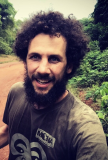
Toni Romani
Toni Romani is a wildlife biologist with extensive experience studying large European carnivores and their relationship to their preys. Toni studied at the University of Udine (Italy) and has developed an innovative approach to studying wildlife through the interpretation of tracks and signs based on the CyberTracker standard. He is currently a PhD student at the Faculty of Artes Liberales and teaches a Primatology master’s program at University of Girona (Spain) entitled ‘Tools and methods of research in primatology’.
Toni will focus his research on the topic of ground nesting (GN) behaviour of chimpanzees in the Northern Democratic Republic of Congo (DRC). Great apes typically construct night nests in which to sleep. In most cases these are arboreal, but gorillas also often sleep terrestrially in GNs. Chimpanzees in over most of their range, nest exclusively in trees, but in a few regions, such as Bili-Uéré and Ituri Forests in Northern DRC, they also use GN. He will investigate factors which may impact the likelihood that chimpanzees will sleep on the ground, including: seasonality; sex; human disturbance; habitat type; vectors and parasite; abundance of predators and other dangerous animals. Culture may also be involved, but we must be careful in our efforts to disentangle this from ecological, morphological and genetic explanations.
In 2019 we plan to visit Ituri Forest, home to chimpanzee population which is likely connected to the Bili region, and compare GN building techniques and distribution with data previously gathered at Bili by Dr. T.C. Hicks and his team.
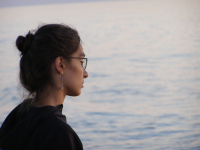
Agata Starownik
She graduated from Polish philology and art history within the MISH at the University of Warsaw. Currently she takes part in the international doctoral program “Nature – Culture” at the Faculty of “Artes Liberales”, University of Warsaw. She is preparing a doctoral dissertation on the metaphysical aspect of the celestial objects in Jan Kochanowski’s works. She participated in numerous nationwide and international conferences (eg. Annual RefoRC Conference on Early Modern Christianity and Annual Conference European Academy of Religion). She published in volumes and journals such as “Prace Filologiczne. Literaturoznawstwo” and “Littera Historica”. Her research interests are the Sacred and expressions of faith in the metaphysical order in literature, the dialogue of literature, nature and astronomy, as well as the reception of the Christian tradition in literature and art.
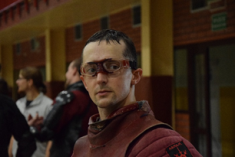
Maciej Talaga
Maciej Talaga received his MA in archaeology (University of Warsaw) in 2012 and joined the ‘Nature-Culture’ PhD programme at the Faculty ‘Artes Liberales’ in 2018. For the last decade his research interests have revolved around pre-modern European martial traditions, with particular focus on late-medieval Central Europe and the so-called ‘German school of fighting’ (Kunst des Fechtens). Having initially approached the topic from purely archaeological perspective – i.e. conducting studies on preserved medieval weaponry as reflections of martial skills – and influenced by his over a decade-long cooperation with the Association for Renaissance Martial Arts ARMA-PL, he gradually adopted a performative approach combining text- and artefact-based studies with practical experimentation. More recently, inspired by the works of Ben Spatz (practice-as-research) and James J. Gibson (ecological psychology), he became interested in the methodological and theoretical underpinnings of research performed on historical sources recording somatic skills. Hence, his doctoral thesis project focuses on developing a methodical framework for practical reconstruction of the martial arts system contained in the anonymous manuscript HS 3227a (Germany, ca. 1390).
Apart from being a PhD student, Maciej is a translator, a martial arts practitioner, and a certified fencing instructor running his own salle.
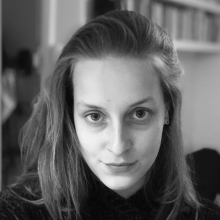
Maria Wodzińska
Maria Wodzińska received her BA at the Faculty of “Artes Liberales” UW in the framework of „Citizen and Society” specialisation. Her bachelor thesis was titled „Pimp my camp. Biopolitical aspects of temporal architecture in the contemporary refugee camps”. She has completed her master’s degree with honours within the international specialisation „Between East and West – history and identity” (the “Artes Liberales” University of Warsaw and Universität zu Köln). The master’s thesis titled “Visuality of politics of memory. Reproductions, clichés, borrowed images and visual hijacking, based on the example of Rwandan genocide remembrance and the conflict in Syria” was defended in 2019.
Maria Wodzinska, in her texts and articles, operates on the intersection of biopolitics and visuality. She analyses relationships between biopolitical strategies of power and contemporary architecture, design, photography, the visual culture and the curatorial approach. In her doctoral dissertation, she intends to analyse some historical cases in which biopolitical or necropolitical population management (including crimes against humanity and genocide) occurred with the possibility of applying the category of “geontopolitics” and “geontopower” in mind. She would like to study whether the famous cases of such crimes were really only focused on human beings and not on nature, environment, or natural resources. In order to accomplish this goal, she will attempt to provide a study of the connections between genocide and ecocide.
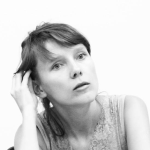
Karolina Żyniewicz
Karolina Żyniewicz - artist (2009 graduated from the Academy of Fine Arts in Łódź, Department of Visual Arts), PhD student (Transdisciplinary PhD Programme at Artes Liberales Faculty, University of Warsaw). Working in a laboratory (mostly at Institute of Genetics and Biotechnology, Faculty of Biology, University of Warsaw) locates her works in the field of bio art. She tries to use her artistic projects as a research method. Her artistic activity is focused on broad understood life (its biological and cultural meaning). Her projects have mostly conceptual character. The visual site of them is rather limited and has sources in laboratory practice. The main point of her research interest are multilevel relations emerging during realization of bio art projects. She tries to put her observations, as an artist, in the context of Science and Technology Studies (STS) and Actor-Network Theory by Bruno Latour.